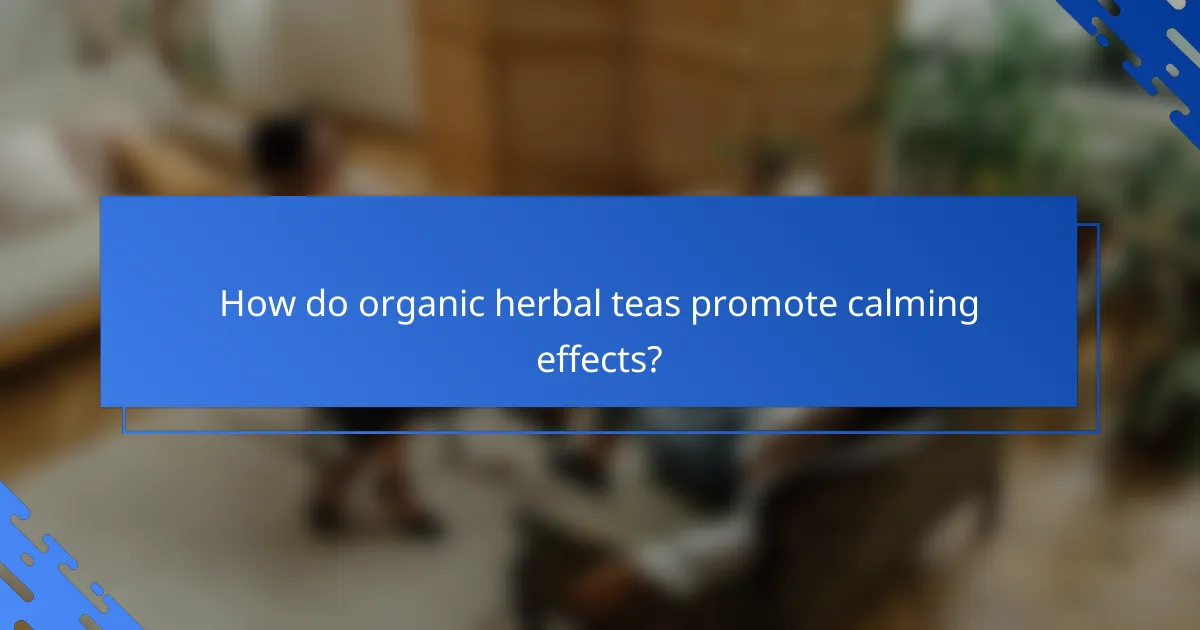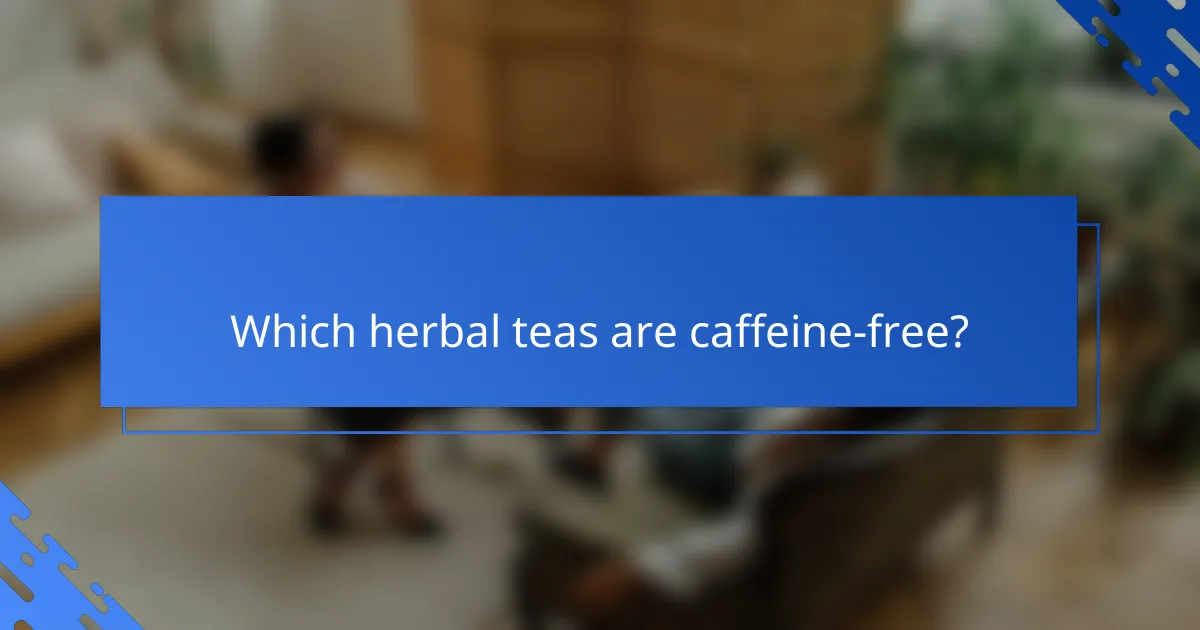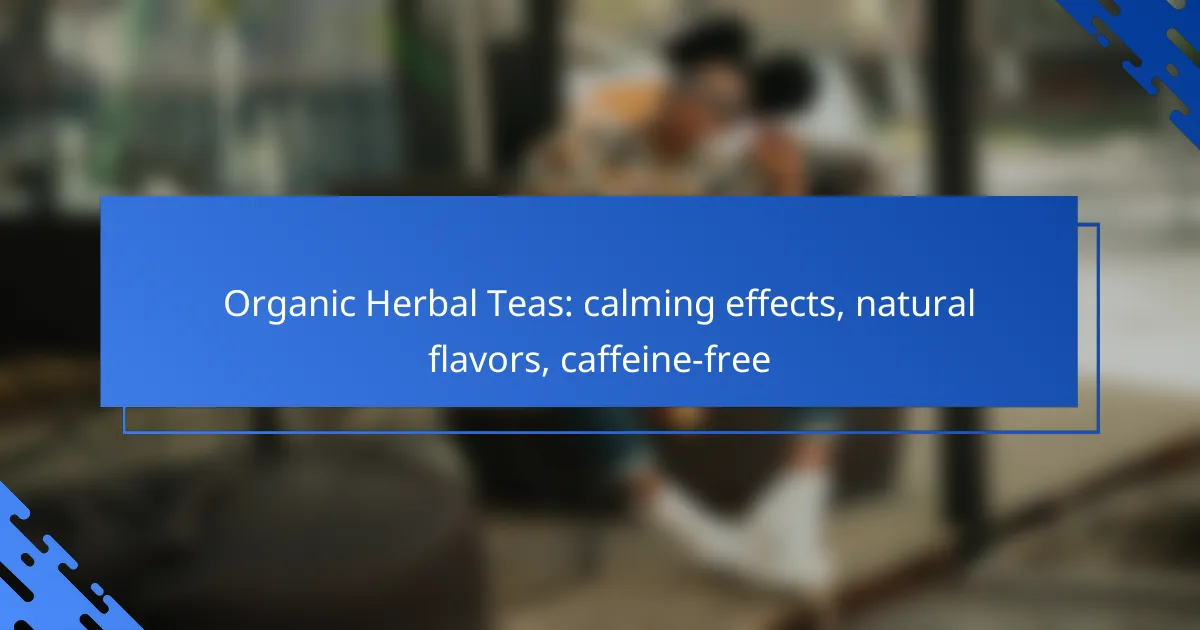Organic herbal teas offer a delightful way to unwind, featuring natural ingredients that promote calming effects and relaxation. With a variety of vibrant flavors derived from herbs, flowers, and fruits, these caffeine-free beverages can be enjoyed at any time of day without the worry of stimulating effects.

How do organic herbal teas promote calming effects?
Organic herbal teas promote calming effects primarily through their natural ingredients, which often contain compounds that help reduce anxiety and improve relaxation. Many herbal teas are caffeine-free, making them suitable for consumption at any time of day without the risk of stimulating effects.
Chamomile tea for relaxation
Chamomile tea is renowned for its calming properties, largely due to the presence of apigenin, an antioxidant that binds to specific receptors in the brain. This interaction can lead to a reduction in anxiety and promote a sense of tranquility.
To maximize its relaxing effects, steep chamomile tea for about 5 minutes. Drinking a cup in the evening can help prepare your body for restful sleep, making it a popular choice for those looking to unwind after a long day.
Lavender tea for stress relief
Lavender tea is celebrated for its soothing aroma and stress-relieving qualities. The essential oils in lavender contain compounds that can help lower cortisol levels, the hormone associated with stress.
For effective stress relief, consider drinking lavender tea during moments of high tension or before bedtime. A typical serving involves steeping dried lavender flowers in hot water for about 10 minutes, allowing the calming scent to fill the air and enhance relaxation.
Valerian root tea for sleep support
Valerian root tea is often used as a natural remedy for insomnia and sleep disturbances. It contains valerenic acid, which may help increase levels of gamma-aminobutyric acid (GABA) in the brain, promoting relaxation and sleepiness.
For best results, consume valerian root tea about 30 minutes before bedtime. Steeping the root for 10-15 minutes can yield a potent brew that aids in falling asleep faster and improving sleep quality.

What are the natural flavors of popular herbal teas?
Popular herbal teas are known for their diverse and vibrant natural flavors, which can range from refreshing to tart and sweet. These flavors are derived from the herbs, flowers, and fruits used in their blends, offering a caffeine-free alternative that can be enjoyed at any time of day.
Mint tea for refreshing taste
Mint tea is celebrated for its invigorating and cooling flavor profile, primarily derived from spearmint or peppermint leaves. This herbal infusion is often enjoyed hot or iced, making it a versatile choice for any season.
The refreshing taste of mint tea can help soothe digestive issues and provide a burst of freshness, making it a popular choice after meals. When brewing, aim for steeping the leaves for about 5-10 minutes to fully extract their flavor and benefits.
Hibiscus tea for tart flavor
Hibiscus tea offers a distinct tart flavor, reminiscent of cranberries or pomegranates, thanks to the dried calyces of the hibiscus flower. This vibrant red tea can be enjoyed hot or cold, and is often sweetened with honey or sugar to balance its natural acidity.
Rich in antioxidants, hibiscus tea is not only flavorful but also supports heart health. When preparing hibiscus tea, steep the dried flowers for 10-15 minutes to achieve the ideal tartness and color.
Rooibos tea for sweet notes
Rooibos tea is known for its naturally sweet and slightly nutty flavor, derived from the leaves of the Aspalathus linearis plant native to South Africa. This caffeine-free herbal tea is often enjoyed plain or blended with other flavors like vanilla or almond.
The sweetness of rooibos makes it an excellent base for various tea blends, and it can be served hot or iced. For optimal flavor, steep rooibos leaves for about 5-7 minutes, allowing the sweet notes to fully develop.

Which herbal teas are caffeine-free?
Many herbal teas are naturally caffeine-free, making them an excellent choice for those looking to avoid stimulants. Common options include peppermint, ginger, and various fruit-infused teas, all of which provide unique flavors and calming effects.
Peppermint tea as a caffeine-free option
Peppermint tea is a popular caffeine-free herbal option known for its refreshing flavor and soothing properties. It can aid digestion and relieve headaches, making it a great choice for relaxation. Brewed from the leaves of the peppermint plant, it contains no caffeine, allowing you to enjoy it any time of day.
When preparing peppermint tea, steep the leaves in hot water for about 5 to 10 minutes. You can enjoy it plain or add a touch of honey for sweetness. This tea is widely available in stores and can also be easily made at home using fresh or dried leaves.
Ginger tea for a caffeine-free alternative
Ginger tea is another excellent caffeine-free herbal option, celebrated for its spicy flavor and numerous health benefits. It is known to help with nausea, improve digestion, and provide anti-inflammatory effects. Like peppermint, ginger tea is naturally free of caffeine, making it suitable for any time of day.
To make ginger tea, slice fresh ginger root and steep it in boiling water for about 10 to 15 minutes. You can enhance the flavor with lemon or honey. This tea is widely available in both loose leaf and bagged forms, making it easy to incorporate into your daily routine.
Fruit-infused teas without caffeine
Fruit-infused teas are delightful caffeine-free beverages that combine various fruits and herbs for unique flavors. These teas can be made from dried fruits, herbs, or a combination of both, offering a refreshing and naturally sweet taste. They are perfect for those seeking a flavorful alternative to traditional teas.
Common fruit-infused options include hibiscus, berry blends, and citrus teas. To prepare, steep the fruit or tea blend in hot water for around 5 to 10 minutes. You can serve them hot or cold, making them versatile for any season. Look for organic options to ensure the best quality and flavor.

How to choose the best organic herbal tea?
Choosing the best organic herbal tea involves considering flavor preferences, checking for organic certifications, and evaluating health benefits. These factors ensure you select a tea that not only tastes good but also meets quality standards and supports your wellness goals.
Consider flavor preferences
Flavor is a key factor when selecting herbal tea, as it can greatly influence your enjoyment. Common flavors include chamomile, peppermint, and hibiscus, each offering unique taste profiles. Consider trying sample packs to explore different options without committing to larger quantities.
Additionally, think about whether you prefer sweet, floral, or earthy notes. Some herbal teas can be blended with fruits or spices to enhance their flavor, so look for blends that appeal to your palate.
Check for organic certifications
When choosing organic herbal tea, look for certifications from recognized organizations such as USDA Organic or equivalent standards in your country. These certifications ensure that the tea is grown without synthetic pesticides or fertilizers, promoting environmental sustainability and health safety.
Be cautious of products labeled as “natural,” as this does not guarantee organic practices. Always read labels carefully to confirm the tea’s organic status before purchasing.
Evaluate health benefits
Different herbal teas offer various health benefits, so consider what you hope to achieve. For example, chamomile is known for its calming effects, while peppermint can aid digestion. Research the specific benefits associated with each type of herbal tea to find one that aligns with your health goals.
It’s also wise to consult with a healthcare professional if you have specific health concerns or conditions, as some herbal ingredients may interact with medications. Aim for teas that support your overall well-being while being mindful of any potential side effects.

What are the benefits of drinking herbal tea regularly?
Drinking herbal tea regularly offers numerous benefits, including improved digestion, enhanced hydration, and support for immune health. These naturally caffeine-free beverages are rich in flavors and compounds that promote overall well-being.
Improved digestion
Herbal teas, such as peppermint and ginger, can aid digestion by relaxing the digestive tract and reducing bloating. These teas often contain compounds that stimulate the production of digestive enzymes, helping to break down food more efficiently.
To maximize digestive benefits, consider drinking a cup of herbal tea after meals. This can help soothe the stomach and promote a more comfortable digestive process.
Enhanced hydration
Herbal teas contribute to daily hydration needs without the caffeine found in traditional teas and coffees. Staying hydrated is essential for maintaining energy levels and supporting bodily functions.
For effective hydration, aim to replace some of your water intake with herbal tea. A variety of flavors, such as chamomile or hibiscus, can make hydration more enjoyable and flavorful.
Support for immune health
Many herbal teas, like echinacea and elderberry, are known for their immune-boosting properties. These teas contain antioxidants and other compounds that can help strengthen the body’s defenses against illness.
Incorporating herbal teas into your routine, especially during cold and flu season, can provide additional support for your immune system. Drinking 1-3 cups daily can be a simple way to enhance your overall health.

How do herbal teas compare to traditional teas?
Herbal teas are distinct from traditional teas primarily due to their caffeine content and flavor profiles. While traditional teas, such as black and green, are derived from the Camellia sinensis plant and contain caffeine, herbal teas are made from a variety of herbs, flowers, and fruits, making them naturally caffeine-free.
Herbal teas lack caffeine
One of the most significant differences between herbal teas and traditional teas is the absence of caffeine in herbal varieties. This makes herbal teas an excellent choice for those looking to reduce their caffeine intake or for consumption in the evening without disrupting sleep patterns.
For individuals sensitive to caffeine, herbal teas offer a soothing alternative. Popular caffeine-free options include chamomile, peppermint, and rooibos, which can be enjoyed at any time of day without the jitters associated with caffeinated beverages.
Flavor profiles differ significantly
The flavor profiles of herbal teas are often more diverse and complex compared to traditional teas. Herbal teas can range from sweet and floral to spicy and earthy, depending on the ingredients used. For example, hibiscus tea has a tart, fruity flavor, while ginger tea offers a warm, spicy kick.
In contrast, traditional teas generally have more subtle flavor notes that are influenced by the processing of the Camellia sinensis leaves. For those exploring herbal teas, experimenting with different blends can lead to discovering unique tastes that cater to personal preferences.










